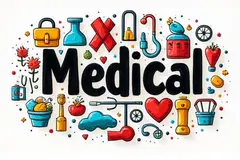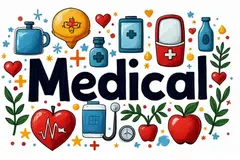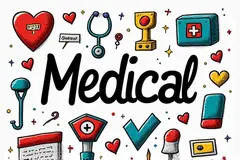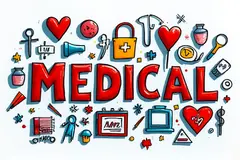Medical articles
Do vaccines prevent autism?
 Debunking Myths: Do Vaccines Cause Autism?
Vaccines have been at the center of a heated debate regarding their potential link to autism spectrum disorder (ASD). This controversy has led many parents to question whether vaccines are safe and effective. It is crucial to address these concerns with accurate, evidence-based information.
Is There a Link Between... read more...
Debunking Myths: Do Vaccines Cause Autism?
Vaccines have been at the center of a heated debate regarding their potential link to autism spectrum disorder (ASD). This controversy has led many parents to question whether vaccines are safe and effective. It is crucial to address these concerns with accurate, evidence-based information.
Is There a Link Between... read more...
B12 injections effect?
 B12 Injections: Effectiveness and Benefits
How Effective Are B12 Injections?
Vitamin B12 injections are highly effective for individuals with a deficiency or those who struggle to absorb oral supplements. These injections deliver vitamin B12 directly into the bloodstream, ensuring optimal absorption and immediate availability of this essential nutrient.
The... read more...
B12 Injections: Effectiveness and Benefits
How Effective Are B12 Injections?
Vitamin B12 injections are highly effective for individuals with a deficiency or those who struggle to absorb oral supplements. These injections deliver vitamin B12 directly into the bloodstream, ensuring optimal absorption and immediate availability of this essential nutrient.
The... read more...
What is psychiatry?
 What Is Psychiatry Today?
Psychiatry, a branch of medicine dedicated to the diagnosis, treatment, and prevention of mental disorders, has evolved significantly over the years. It encompasses a wide range of therapeutic approaches and interventions designed to address various psychological conditions. In today's world, psychiatry plays an essential role in... read more...
What Is Psychiatry Today?
Psychiatry, a branch of medicine dedicated to the diagnosis, treatment, and prevention of mental disorders, has evolved significantly over the years. It encompasses a wide range of therapeutic approaches and interventions designed to address various psychological conditions. In today's world, psychiatry plays an essential role in... read more...
Is it safe to take NSAIDs (like ibuprofen) long-term?
 Is It Safe to Take NSAIDs Long-Term?
Nonsteroidal anti-inflammatory drugs (NSAIDs) are commonly used for pain relief and reducing inflammation. However, concerns arise when these medications are taken over prolonged periods due to potential side effects and risks. This article delves into the safety of long-term NSAID use, focusing on ibuprofen as a... read more...
Is It Safe to Take NSAIDs Long-Term?
Nonsteroidal anti-inflammatory drugs (NSAIDs) are commonly used for pain relief and reducing inflammation. However, concerns arise when these medications are taken over prolonged periods due to potential side effects and risks. This article delves into the safety of long-term NSAID use, focusing on ibuprofen as a... read more...
How does the immune system fight viruses?
 The human immune system is a complex network of cells, tissues, and organs that work together to defend against harmful pathogens, including viruses. Understanding how your body fights off these invaders daily can provide valuable insights into maintaining optimal health.
How Your Body Fights Off Harmful Viruses Daily
Your immune system operates continuously... read more...
The human immune system is a complex network of cells, tissues, and organs that work together to defend against harmful pathogens, including viruses. Understanding how your body fights off these invaders daily can provide valuable insights into maintaining optimal health.
How Your Body Fights Off Harmful Viruses Daily
Your immune system operates continuously... read more...
How does the body regulate its magnesium levels?
 How Does Your Body Regulate Magnesium Levels?
Magnesium is an essential mineral that plays a crucial role in numerous physiological processes within the human body. From muscle and nerve function to energy production, magnesium is indispensable for maintaining optimal health. However, the body's ability to regulate magnesium levels is complex and involves... read more...
How Does Your Body Regulate Magnesium Levels?
Magnesium is an essential mineral that plays a crucial role in numerous physiological processes within the human body. From muscle and nerve function to energy production, magnesium is indispensable for maintaining optimal health. However, the body's ability to regulate magnesium levels is complex and involves... read more...
Causes and effects of insomnia?
 Causes and Effects of Insomnia
Insomnia is a common sleep disorder that affects millions of people worldwide. It can be caused by various factors, ranging from stress and anxiety to medical conditions and lifestyle choices. Understanding the causes and effects of insomnia is crucial for managing this condition effectively.
What Causes Insomnia?
The root... read more...
Causes and Effects of Insomnia
Insomnia is a common sleep disorder that affects millions of people worldwide. It can be caused by various factors, ranging from stress and anxiety to medical conditions and lifestyle choices. Understanding the causes and effects of insomnia is crucial for managing this condition effectively.
What Causes Insomnia?
The root... read more...
Can high blood pressure cause dizziness?
 Does High Blood Pressure Cause Dizziness?
High blood pressure, also known as hypertension, is a common condition that affects millions of people worldwide. One of the most frequently asked questions about this health issue is whether it can cause dizziness or vertigo. This article aims to explore the relationship between high blood pressure and dizziness in... read more...
Does High Blood Pressure Cause Dizziness?
High blood pressure, also known as hypertension, is a common condition that affects millions of people worldwide. One of the most frequently asked questions about this health issue is whether it can cause dizziness or vertigo. This article aims to explore the relationship between high blood pressure and dizziness in... read more...
What increases the risk of stroke recurrence?
 Preventing Another Stroke After Recovery
Recovering from a stroke can be challenging, but taking proactive steps to prevent another stroke is crucial. Understanding and addressing risk factors that increase the likelihood of a second stroke can significantly improve your quality of life.
Key Risks for Repeat Strokes
Several key risks contribute to an... read more...
Preventing Another Stroke After Recovery
Recovering from a stroke can be challenging, but taking proactive steps to prevent another stroke is crucial. Understanding and addressing risk factors that increase the likelihood of a second stroke can significantly improve your quality of life.
Key Risks for Repeat Strokes
Several key risks contribute to an... read more...
Can dehydration cause dark urine?
 Does Dehydration Turn Urine Dark?
Dehydration is a common condition that can have various effects on the body, including changes in urine color. When you don't drink enough water, your body becomes dehydrated, and this can lead to darker urine.
Is Dark Urine Linked to Dehydration?
The link between dark urine and dehydration is well-established. As your body... read more...
Does Dehydration Turn Urine Dark?
Dehydration is a common condition that can have various effects on the body, including changes in urine color. When you don't drink enough water, your body becomes dehydrated, and this can lead to darker urine.
Is Dark Urine Linked to Dehydration?
The link between dark urine and dehydration is well-established. As your body... read more...
Can stress cause hair loss?
 Stress is a common experience in today's fast-paced world, and it can have various negative effects on your health. One of the most noticeable consequences of stress is hair loss. But does stress really cause hair loss? This article delves into the intricate relationship between stress and hair health.
Does Stress Trigger Hair Loss?
The question of whether... read more...
Stress is a common experience in today's fast-paced world, and it can have various negative effects on your health. One of the most noticeable consequences of stress is hair loss. But does stress really cause hair loss? This article delves into the intricate relationship between stress and hair health.
Does Stress Trigger Hair Loss?
The question of whether... read more...
Ulcers: causes, symptoms, and effective treatments
 What Causes Peptic Ulcers?
The primary causes of peptic ulcers are:
Helicobacter pylori (H. pylori) infection: This is the most common cause of stomach ulcers, as H. pylori bacteria can weaken the protective coating in your stomach and duodenum.
Long-term use of nonsteroidal anti-inflammatory drugs (NSAIDs): Medications like aspirin, ibuprofen, and... read more...
What Causes Peptic Ulcers?
The primary causes of peptic ulcers are:
Helicobacter pylori (H. pylori) infection: This is the most common cause of stomach ulcers, as H. pylori bacteria can weaken the protective coating in your stomach and duodenum.
Long-term use of nonsteroidal anti-inflammatory drugs (NSAIDs): Medications like aspirin, ibuprofen, and... read more...